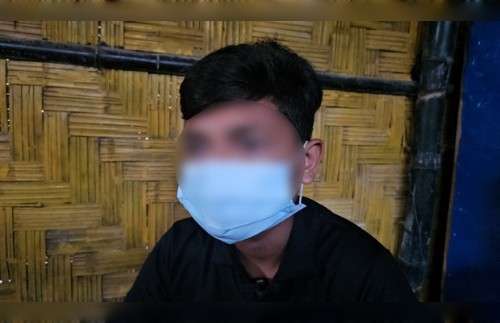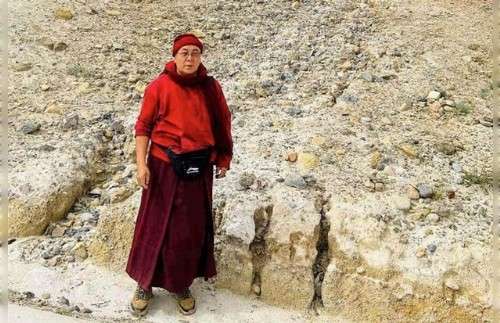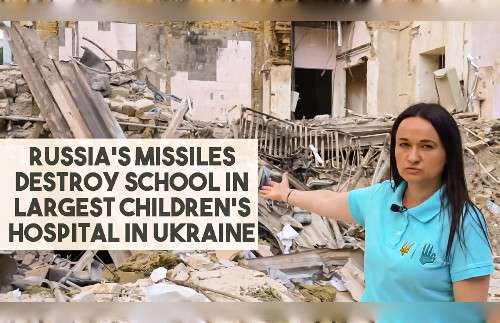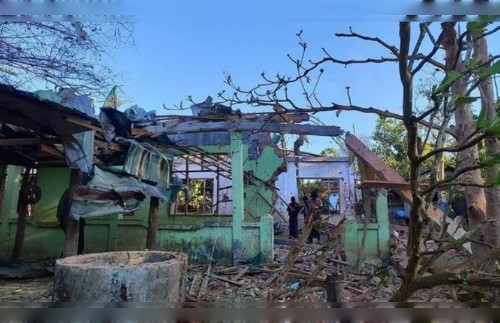
Thousands of fearful villagers have fled communities in Myanmar’s war-ravaged Rakhine state, where a Myanmar military unit has been conducting door-to-door searches for rebel ethnic soldiers, residents of the affected villages said Wednesday.
The searches for Arakan Army (AA) troops took place all day in Myo Chaung and Pan Myaung villages on the border between Mrauk-U and Minbya townships in the northern part of the state where hostilities between the two militaries have escalate since late last year, they said.
“Yesterday was really bad,” said Kyaw Myint, a resident of Pan Myaung village. “They [government soldiers] started from Myo Chaung village with their search [for AA fighters] and reached the edge of Pan Myaung village. The government soldiers changed to civilian clothing and entered the village firing their guns. All the villagers ran for their lives.”
To search operation along with some shooting incidents by government soldiers caused more than 500 local residents to take sanctuary on the grounds of Aung Mingalar Monastery, while more than 2,000 sought safety inside the Shwe Phaung Tin Monastery compound, they said.
“An IDP [internally displaced persons] camp has been opened in Shwe Phaung Tin monastery compound, Kyaw Myint said. “It’s already harboring a large number of people.”
When Myanmar soldiers entered villagers’ homes, they beat some, detained others, and stripped more then 130 of them of their shirts and made them stay outside in the burning sun, said Abbot Pyinnyar Wontha of Shwe Phaung Tin monastery. He said he does not know how long the monastery can host the IDPs.
“Then they asked where the AA soldiers were located,” he said. “Now the villagers are scared of the soldiers and have fled their homes.”
During the search, Myanmar soldiers took away four villagers — Khin Maung, 30, and Kyaw Aye Maung, 25 from Myo Chaung village and Soe Win Naing, 22, and Maung Myint Hlaing, age estimated to be about 30, from Ywa Thit ward — for supposedly having connections to the AA, residents and family members said.
“They took two villagers from Myo Chaung village and two from Ywa Thit ward,” Kyaw Myint said. “We haven’t heard anything from them since.”
Kyaw Kyaw Hla from Aung Mingalar Monastery said the government troops fired the government troops fired indiscriminately at the villagers.
“The soldiers entered the villages and did whatever they wanted,” he said. They fired their guns at random and apprehended the villagers for questioning. They caused so much panic.”
The Myanmar Army views Rakhine villagers as AA sympathizers, Kyaw Kyaw Hla said.
“So, they brutally questioned the villagers if they found them in the village,” he said. “They got angrier if they were not in the village. They said they would torch the houses if nobody was found in the village.”
The AA, a Buddhist Rakhine military fighting for autonomy in the state, was branded a terrorist organization by the Myanmar government after it carried out deadly attacks on police outposts in the state early this year, leaving 13 dead. A similar assault on another police outpost in early March killed nine officers and wounded two others.
RFA’s Myanmar Service was unable to reach Colonel Win Zaw Oo, commander of the Western Regional Military Command to confirm the arrests.
RFA was also unable to contact AA spokesman Khine Thukha to confirm if AA members were hiding in villages on the border between Minbya and Mrauk-U townships.
Meanwhile, the influx of residents of Pan Myaung and Myo Chaung villages who have left their homes has stretched the two monasteries housing them to their limits.
Abbot Pyinnyar Wontha said he does not know how long the Shwe Phaung Tin monastery can host the IDPs.
“We requested that they go back home in one or two days, but their numbers have swelled to over 2,000 since yesterday,” he said.
Mrauk-U villagers still missing
One month has passed since the families of six people in Mrauk-U township were detained by the Myanmar military during clashes with the AA, and haven’t been heard from since.
Maung Win Sein, 35; Aye Thein, 33; Maung Shwe Soe, 29, from Thar-Zi village; Sein Thar Kyaw, 46, from Taung Oo village; and Hla Htun Chae, 61, from Yan-Aung-Myae village — disappeared on Feb. 19 during an intense battle in the township’s Yan Chaung region.
Myo Min Zaw, 19, from Kya-Nat-Kan village in Kyauktaw township, north of Mrauk-U, also went missing the same day. Tun Nu, the head of the township’s Taung Min Kular village also went missing during the skirmishes.
Their family members, who insist that the men have no ties to the AA, said they filed missing person reports at a local police stations but have heard nothing since.
RFA was unable to reach the police stations in Mrauk-U and Kyauktaw townships.
Oo Myint Htay, wife of Maung Win Sein, said a stranger with a mixed Myanmar-Rakhine accent answered her husband’s cell phone when she called his number.
“He told me not to call him if it’s nothing urgent,” she said. “With all the fighting going on, I was very worried because it was not my husband answering the phone and a stranger was answering it. I called the second time but no one answered. Since then, the phone has been turned off so it can’t receive calls anymore.”
Dar Sein, wife of Hla Htun Chae from Yan Aung Pyin village, said her husband was arrested by the Myanmar military’s 22nd Division.
When she went to the army compound to inquire about her husband after he didn’t come home from cattle herding, she found him being tied up, she said.
“They tied my husband up,” she said. “When I got there, my husband Hla Htun Chae asked me to redo his sarong.”
After a while, he was summoned by the captain, and soldiers asked Dar Sein to go home.
“I said I’d go home with my husband because he has hypertension and is not in good health,” she said.
“The soldiers told me not to worry and asked me to leave,” she said. “I left and haven’t heard from my husband since then.”
‘They had done it’
Hla Htun Chae is the only one of the missing men confirmed to be detained by the military, while the fate of the remaining villagers remains unknown.
Some believe the missing men may be among three charred bodies discovered in a valley east of Yan Aung Pyin village on Feb. 21.
“I went there to investigate with the village head and elders of Kyar Nat Kan, but we saw only the piles of ashes,” said Sein Hla Maung, head of Yan Aung Pyin village. “It was where military troops had been stationed, so we concluded that they had done it.”
RFA could not independently confirm that the charred bodies found near Yan Aung Pyin village were the work of the government troops.
A spokesman for Myanmar military’s information committee told RFA on Feb. 25 that soldiers apprehended the local residents only as part of investigations and that they have not forcibly detailed any civilians. The AA also denied detaining them.
Tun Thar Sein, a lawmaker who represents Mrauk-U township in the Rakhine state parliament, said state officials should inform the families about their missing relatives.
“The state government is responsible for protecting its local citizens,” he said. “The government needs to give explanation to the family members of those who have been missing for a month.”
AA joins talks
The AA is one of a handful of ethnic armies fighting the government military in some of Myanmar’s ethnic minority areas.
The Myanmar government’s peace commission has invited eight organizations that have not signed a nationwide cease-fire — including the AA and its political wing, the United League of Arakan — to attend collective peace discussions for the first time on Thursday.
Some delegates from the various groups and a Chinese representative arrived in Myanmar’s capital Naypyidaw on Wednesday.
Colonel Kyaw Han leads AA delegation.
After holding talks with government peace negotiators, representatives from each ethnic armed group will meet individually with representatives from the Myanmar military on Friday.
The talks are an effort to jump-start the country’s stalled peace process to end decades of armed conflict in Myanmar.
Reported by Kyaw Thu, Min Thein Aung, and Khin Khin Ei for RFA’s Myanmar Service. Translated by Ye Kaung Myint Maung and Khet Mar. Written in English by Roseanne Gerin.
- Copyright © 1998-2016, RFA. Used with the permission of Radio Free Asia, 2025 M St. NW, Suite 300, Washington DC 20036.



















